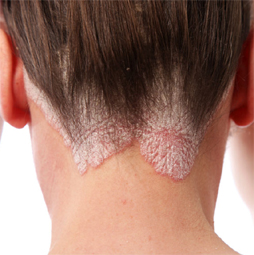
What is Psoriasis?
Psoriasis is a chronic skin condition caused by an overactive immune system.Psoriasis is very common, chronic, immune mediated disease that causes dry, red, scaly patches and flakes to appear on the skin. The rash often goes away for a while, but then it flares up again, often as a result of a trigger, such as stress.
Psoriasis is a chronic disease that often comes and goes. The main goal of treatment is to stop the skin cells from growing so quickly
Symptoms
Skins cells shed all the time, but in psoriasis, both dead and live cells collect on the skin’s surface, because the replacement process is so fast.
The main symptoms of psoriasis are:
- red, flaky, crusty patches, covered with silvery scales that shed easily
- intense itching and burning
However, symptoms can differ, according to the type. Severity can range from mild to severe.
According to the National Psoriasis Foundation:
- mild psoriasis covers less than 3 percent of the body
- moderate psoriasis affects between 3 and 10 percent
- severe psoriasis covers over 10 percent of the body.
Around 80 percent of people have mild psoriasis, and the other 20 percent have moderate to severe psoriasis.
Psoriasis can affect any part of the body, but it mostly appears as small patches on the elbows, knees, lower back, and scalp.
Types
There are several forms of psoriasis.
Plaque psoriasis: About 80 to 90 percent of people with psoriasis have plaque psoriasis. It appears as raised, inflamed, red lesions, covered by a silvery, white scales, usually on the elbows, knees, scalp, and lower back.
Inverse psoriasis: Inverse psoriasis appears in the armpits, the groin, under the breasts, and in other skin folds such as around the genitals, and the buttocks. It first appears as red lesions, usually without the scale associated with plaque psoriasis. It may appear smooth and shiny.
Erythrodermic psoriasis : Erythrodermic psoriasis is a particularly inflammatory form that can affect large parts of the body surface with a fiery redness. Erythema means reddening.Erythrodermic psoriasis can also trigger infection, pneumonia, and congestive heart failure.
Erythrodermic psoriasis : Erythrodermic psoriasis is a particularly inflammatory form that can affect large parts of the body surface with a fiery redness. Erythema means reddening.Erythrodermic psoriasis can also trigger infection, pneumonia, and congestive heart failure.
The complications of erythrodermic psoriasis can be life threatening. Anyone who may have symptoms of this condition should see a doctor at once.
Guttate psoriasis: Guttate psoriasis often starts in childhood or young adulthood. It appears as small, red, individual spots on the skin that are not normally as thick or as crusty as the lesions in plaque psoriasis.
Pustular psoriasis: It appears as white pustules, or blisters, of non-infectious pus, surrounded by red skin. It can affect certain areas of the body, for example, the hands and feet, or most of the body. It is not an infection, and it is not contagious.Pustular psoriasis tends to follow a cycle, in which reddening of the skin is followed by the formation of pustules and scaling.
Psoriatic arthritis: This causes inflammation and progressive damage to the joints. It is most common between the ages of 30 to 50 years.
Other complications: People with psoriatic disease commonly experience social exclusion and low self-esteem. Together with the physical discomfort, itching, and pain of psoriasis, this can impact their quality of life.
Causes
Psoriasis is an autoimmune disease. It happens when a problem occurs with the immune system.
The immune system involves a type of cells known as T cells. A trigger causes the T cells to behave as if they are fighting an infection or healing a wound. They produce chemicals that cause inflammation.
In psoriasis, this leads to an excessive growth of skin cells and inflammation.
people with psoriasis may find that stress and anxiety, injuries to the skin, infections, and hormonal changes can lead to a flare up.
All Diseases
Opening Hours
- Monday To Saturday 11:00 AM - 1:00 PM
6:00 PM - 8:00 PM - Sunday Closed